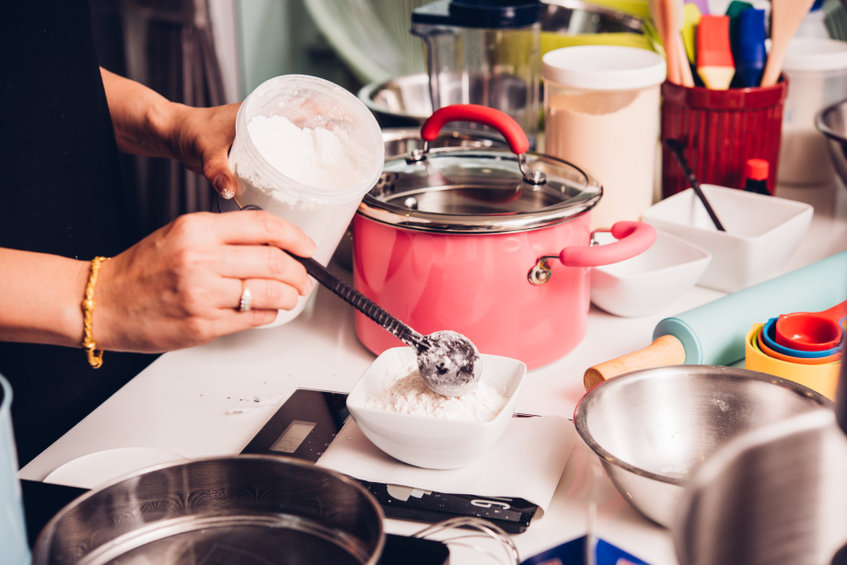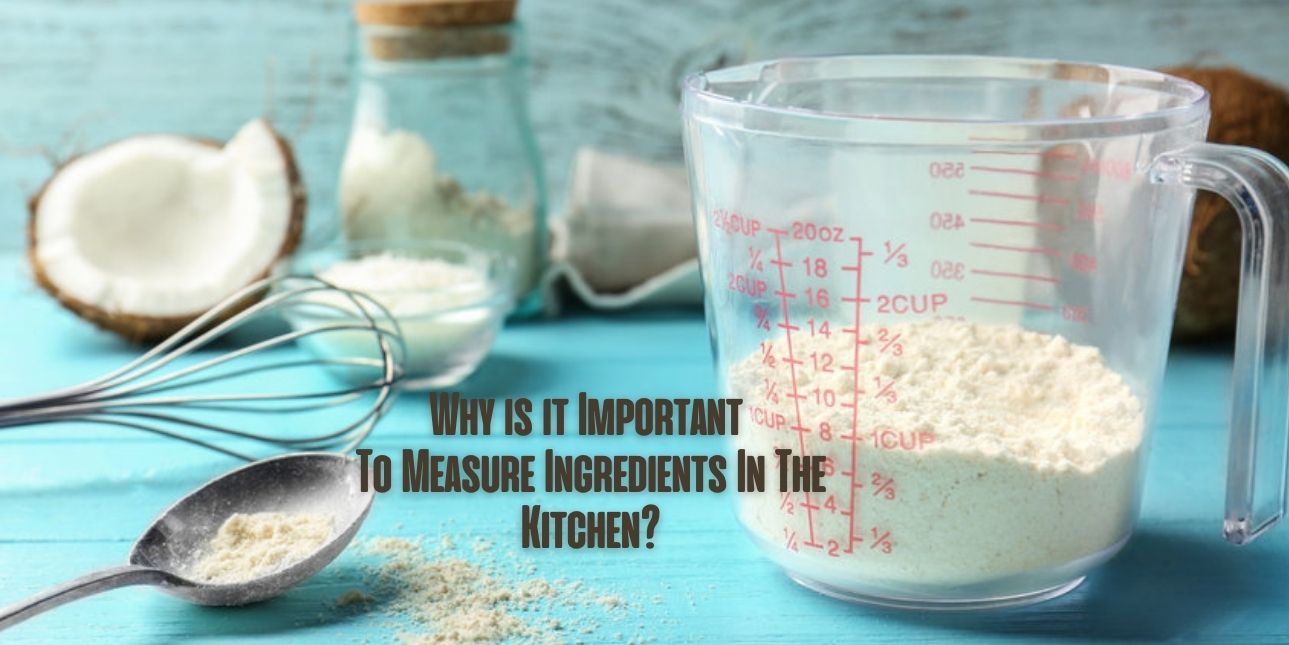Consistency is extremely important in commercial kitchens. Measuring each ingredient can help in delivering delicious dishes consistently. You should measure different types of ingredients like spices, seasonings, and other special ingredients depending upon the recipe’s requirements. A measuring scale is the most important commercial kitchen equipment. With measuring scales, you can save money in the long run. Weighing can also help reduce calories and encourage healthy eating.
In this article, we discuss the importance of measuring ingredients accurately in a kitchen, why measuring accurately is important while cooking, the essential kitchen measuring tools, how to avoid discrepancies while weighing ingredients, the importance of measuring equipment accurately, how to cook without measuring, and the items to measure in a commercial kitchen.
Why is Measuring Accurately Important in Cooking?
Cooking is a science that can be honed over time. It can only come from experience and years of practice. However, measuring ingredients correctly is key to creating delicious dishes. Professional chefs understand the importance of precise measurement and consistency in terms of taste. Baking requires a lot of measurements, and without clear measurements, baked goods can taste off, which is not ideal. If you are making cookies, excess baking powder can make the cookie dough rise quickly and also create a sink in the middle. Additionally, the taste can also deteriorate due to the excess use of baking powder.
Essential Kitchen Measurement Tools
Kitchen measurement tools are highly essential for various foodservice businesses. For basic kitchen measurements, you can use the following tools for your foodservice establishment:
- Dry Measuring Cups: With dry measuring cups, you can measure essential baking ingredients like sugar, flour, chocolate, and coffee. To make desserts and desserts, you can use dry measuring cups. These cups come in various sizes, and you should purchase the perfect dry measuring cup according to your foodservice requirements.
- Liquid Measuring Cups: Liquid measuring cups are ideal for various purposes. Professional chefs use liquid measuring cups for measuring milk, water, or oil. Most liquid measuring cups come equipped with a pouring spout and volumetric marks for ease of use. These cups will help you measure the volume of liquid ingredients poured accurately. The glass measuring cup is designed for measuring liquids. You can also use commercial refrigerators to refrigerate liquid items after measuring them.
- Measuring Scale: The commercial kitchen measuring scale is an essential measuring tool for foodservice establishments. Before blending all the ingredients, you can fill a dry measuring cup with flour, sugar, or coffee and measure the exact amount of the ingredient required for precision. Additionally, you can spoon flour and other dry ingredients into a measuring cup before leveling. For consistency in taste, you need to measure each ingredient separately on a measuring scale.
How to Avoid Discrepancies While Weighing Ingredients
The best way to avoid discrepancies while cooking is by placing a measuring bowl on a scale and pressing ‘Tare’. Pressing ‘Tare’ subtracts the weight of the measuring bowl from the reading. Then, pour or place the ingredients in the bowl and measure.
It is essential for your staff to learn different measurement units and their usage. The milliliter button on a scale assumes that the weight per volume stays the same for all ingredients. That is not always the case as liquids can have different densities. Various types of oils can have a lower density than water, whereas the density of corn syrup and other liquids is higher than water.
Why is it Important To Measure Ingredients Accurately?

The taste of your dish can change drastically when the wrong amount of ingredients is used. Professional chefs prefer measuring each ingredient separately before preparing any dish.
Here are some points regarding the importance of measurements in a commercial kitchen:
- Cook Better Food: When creating dishes first, chefs try various combinations and iterations before finalizing the weight of all ingredients used to create the perfect dish. Once it is finalized, chefs follow the amount of ingredients, to the dot, for greater consistency. For baked foods, using excess flour can make cookies or cakes dry. Additionally, using excess sugar in the cookies can make it brittle.
- Accuracy: Accuracy is extremely important for creating delicious dishes. Using jugs, glasses, or other measuring tools can result in inconsistency in taste and the final texture of the cooked food items. On the other hand, a weighing scale provides exact measurements of ingredients.
- Weight and Volume: Chefs measure ingredients either by volume or weight. A weighing scale with a digital display can show volume and weight. With measuring scales, you can deliver consistent results.
- Portioning: With commercial weighing scales, you can create perfect portions of dishes. Portioning is especially important for your health-conscious patrons. Portioning can help in maintaining the number of calories in a dish.
- Consistency: Consistency in measurements can result in repeat customers. To make a multiple-layer cake, you can divide the mixture into layers uniformly. Consistency helps create identical results.
- Cleaning: A weighing scale or weighing tool can help streamline the measuring process. You can use a single weighing scale to measure all ingredients. A clean measuring or weighing scale will give precise measurements, and with accurate measurements, you can control food wastage. Additionally, you can weigh food items quickly if your weighing scale needs less cleanup.
- Profitability: Measuring ingredients will decrease wastage of ingredients, and boost profitability.
How To Cook Without Measuring
Though it is not recommended, you can try cooking without measuring. Experienced chefs can cook without measuring, but most chefs use measuring tools for greater accuracy. Cooking without measuring tools requires years of experience, yet there is still a high chance of failure. Excess use of ingredients like flour, butter, salt, sugar can ruin cakes, cookies, and other baked goods.
What To Measure and How to Measure
Cooking and baking require a lot of measurements that help in preparing delicious dishes consistently in the kitchen. Additionally, there are a variety of things that chefs need to take care of during kitchen measurements. Chefs can measure liquids like water, syrup, and flour with liquid cups.
Measuring granulated sugar is very simple, but measuring brown sugar can be difficult. White sugar can be poured easily, but brown sugar becomes clumpy. You can also measure herbs with measuring scales. First, chop or cut down the green leaves of basil and transfer them into a measuring cup. There should be a minimal gap when the chopped basil is used to fill the measuring cup tightly. Tea leaves and coffee powder are also some of the ingredients that can be perfectly measured by measuring scales.
A List of Commercial Kitchen Equipment Necessary For Commercial Kitchens
Commercial kitchens require advanced techniques along with the right set of equipment to serve your patrons. You can choose from commercial measuring scales, commercial refrigerators, commercial ranges, and other commercial kitchen equipment.
Learning the most important measuring techniques helps in optimizing the cooking process. Using the right set of measuring equipment can increase efficiency and as a result, significantly boost profit margins. Most commercial kitchen scales and measuring equipment come equipped with metric and imperial measures. Some old-generation scales come with a milliliter button.









